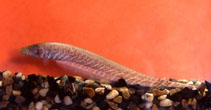| Family: |
Gymnotidae (Naked-back knifefishes), subfamily: Gymnotinae |
| Max. size: |
76 cm TL (male/unsexed); max.weight: 1,243.0 g |
| Environment: |
benthopelagic; freshwater; pH range: 6 - 7.5; dH range: 15, potamodromous |
| Distribution: |
Central and South America: southern Mexico to Paraguay, including Trinidad. |
| Diagnosis: |
|
| Biology: |
Aggressive (Ref. 27188). Inhabits turbid slow moving or standing waters (Ref. 11225). Found also in shallow edges of streams (Ref. 75964). Can survive when ditches, canals and small ponds dry out. (Ref. 11225). Feeds mainly at night on worms, insects (e.g. odonate larvae), shrimps, fish (preferably small characids, e.g. Ctenobrycon and Curimata) and plant matter (Ref. 7020; 10011). Oviparous (Ref. 205). Mouth brooding by males is observed in this species (Ref. 55570). Males provide parental care in nests excavated for eggs and larvae (Ref. 55570). Uses its long anal fin for locomotion. Can distinguish between a `friendly neighbor' and a potentially `threatening stranger' based on electric organ discharge (EOD) waveform alone (Ref. 10011). Relationship between EOD pattern and agonistic behavior in this species has been demonstrated (Refs. 10531, 10532, 10533). Shows auditory abilities, responding best to a frequency of 1000 Hz, with an upper limit above 5000 Hz (Ref. 10831). Also responds to vibratory stimuli (water waves: 125-250 Hz) with transient increase in EOD rate (Ref. 10834). 'Prefers' temperatures of 24-25°C (Ref. 10836). |
| IUCN Red List Status: |
Least Concern (LC); Date assessed: 09 July 2018 Ref. (130435)
|
| Threat to humans: |
harmless |
Source and more info: www.fishbase.org. For personal, classroom, and other internal use only. Not for publication.
